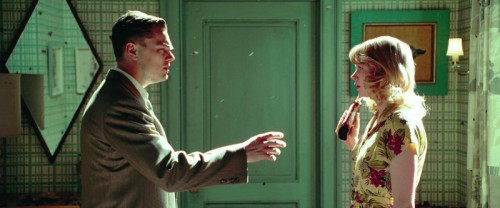
 A beautiful entry to the NY Times’ Modern Love series appeared this past weekend, Mark Lukach’s brave “Out of Darkness,” which reflects on his wife’s unexpected and prolonged period of mental illness, and his default role as a caregiver during that time. For whatever reason, stories of husbandly love are pretty thin in the column itself, and some might say they are hard to find, period. Perhaps this is because men tend not to write about these things as much, or perhaps because the kind of nurturing being recounted here is (falsely) viewed as a purely feminine domain, I don’t know. But the piece is a profound illustration of one-way love – in fact, one marvels at LuKach’s ability to write about it without turning himself into more of a hero.
A beautiful entry to the NY Times’ Modern Love series appeared this past weekend, Mark Lukach’s brave “Out of Darkness,” which reflects on his wife’s unexpected and prolonged period of mental illness, and his default role as a caregiver during that time. For whatever reason, stories of husbandly love are pretty thin in the column itself, and some might say they are hard to find, period. Perhaps this is because men tend not to write about these things as much, or perhaps because the kind of nurturing being recounted here is (falsely) viewed as a purely feminine domain, I don’t know. But the piece is a profound illustration of one-way love – in fact, one marvels at LuKach’s ability to write about it without turning himself into more of a hero.
Obviously for a marriage to work, for it not to devolve into utter co-dependency, there has to be give-and-take. Things cannot remain lop-sided forever without resentment coming into play. We are not God to our spouse (or anyone else), after all. But that’s not to say there aren’t brief periods when a lover bears the burden of the beloved, and we catch a glimpse of Grace: of the way God loves us. When Lukach talks about suppressing his own emotions for the sake of his wife, we may know that the imbalance can’t last, but that doesn’t make the sacrifice any less touching. Who wouldn’t want to be loved like this? Two hours, by the side of the road…:
Two years ago, when Giulia and I were 27 and in our third year of marriage, she suffered a psychotic break. She had no history of mental illness preceding the abrupt arrival of delusions and paranoia. It was a bewildering decline that snowballed from typical work stress to mild depression to sleeplessness to voices speaking to her in the night…
The fact that she did not speak much [while on anti-psychotic medication] also meant that I spoke a lot, about silly things, things that filled the silence so that I could try to keep her mind here with me, and not adrift in her illness. But occasionally she spoke on her own, without prompting, and beyond “Yes” or “No.” Those rare moments of self-initiated conversation were always about one of two subjects: suicide or love.
The suicide conversations were never fun. They happened over and over. Out of nowhere, in the midst of one of our agreed-upon dog walks, or while washing the dishes or whatever, often as I talked about something insignificant, Giulia would interrupt and say, “Mark, if someone kills themselves, do they still get a funeral?”…
These suicidal conversations could be quick or they could be slow. One time we were biking to yoga together, and we had to pull over and sit on the sidewalk for almost two hours while she sobbed and begged me to let her kill herself. I pleaded with her to just hang on through this moment, and that it would pass, and that she would someday, somehow, start to feel better again.
When the suicidal feelings gripped her tightly, her whole body groaned and wailed over the loss of control of mind and feelings. I would hold her, but I learned that all I could do in those moments was to sit there and let it be, so I did. And then the fog would clear, the suicidal impulses would slip back under the surface, and the muted, agreeable Giulia would return.
“Are you O.K. now, honey?”
Pause. “Yes.”
“Do you know how proud of you I am, and how much I love you?”
Pause. “Yes.”
“Are you ready to get back on the bike and go home?”
Pause. “Yes.”
…In our conversations about love, which also would arise unprompted, Giulia would interrupt whatever we were doing to tell me how much she loved me… As her spouse and caregiver, one of my biggest struggles was to keep my own emotions in check. She was too fragile to witness how much her delusions, paranoia and depression scared and worried me, so I had to pretend that none of it bothered me.
I became a master at compartmentalizing my worry and anxiety, neatly packaging my feelings into the small, permissible moments when I had the time and space, away from Giulia. For the most part, though, I was her cheerleader, and nothing, no matter how dark or despairing, could shake me.
But when she told me she loved me? That I was saving her life? And that she was staying alive not for herself, but for me? Those moments always left me stunned, teary-eyed and breathless. I had no defense against those. They left me reaching to her to find my stability, rather than the other way around. How can you shield yourself from the impact of someone saying, “I love you”? And why would you?
I’m glad to have left behind the anxiety and unknowns of dealing with a serious mental illness. It was a grueling year for both of us. And yet when I look back on that year, I have to admit there is a part of me that misses it — or, more accurately, a part of it that I miss.
I don’t miss the illness itself, of course… But I do miss how much we talked about life and love that year. It seemed like all we ever talked about. In one sense we have never communicated less in our relationship and never been in such different mental spaces, yet in another sense we were closer emotionally than we have ever been and more deeply connected. Her mental illness cast such a strange web of paradoxes into our life together.
Nowadays we bicker about things like doing the dishes. One of us will say, “I cooked dinner, so can you wash the dishes?”
And the other will respond, “Well, I did the laundry today and folded it and put it away, so no.”
“But I walked the dog by myself tonight.”
“But I made the bed.”
Until finally one of us does the dishes.
When Giulia was sick, we did the dishes together because there was nothing else to do. As long as we were together, we could agreeably wait out the disease and show it that we were more patient than it was.
I think that’s what I miss. We weren’t in a rush to do anything else, because there was no certainty of a future. So we defaulted to living in the present, focusing on each moment of our “Yes and No” days. A time when only two things mattered to us: life and love.
Those final few paragraphs may be my favorite part of the piece – certainly what keeps it out of fairy tale land. After his wife has recovered somewhat and the 100-0 caregiving ratio is no longer in place, scorekeeping rears its ugly head. And when it does, Lukach laments more than the re-introduction of the Law/Expectation vis-a-vis their relationship, he laments the Gods-eye perspective that life-or-death suffering allows, the present-tense lucidity of non-coercive love. He misses a relationship based on self-emptying rather than self-fulfillment. He longs for grace, in other words, the sort that’s sadly never on permanent offer. With one notable exception, that is.
[youtube=www.youtube.com/watch?v=T-mglLyOb88&w=600]

COMMENTS
4 responses to “Suicidal Psychosis, Young Marriage and One-Way Love”
Leave a Reply















Beautiful and powerful story. Thank you for sharing this!
Ooof, that gets you in the gut. It gives some serious perspective on “in sickness and health” and “till death do us part.” Loved it though- thanks for posting!
The “Do you know how proud of you I am, and how much I love you?” line leveled me! Thanks M’bird!
Wow. What a stupendous post and story.
I’ve been dialoguing with some friends about divorce lately, and how prevalent a negative “gimme gimme gimme” scenario of marriage seems to be in our culture. This is a great example of how easy it would have been to give up, and yet how much more meaningful it is that he stayed. In the context of a heated discussion about the ad for the show “Happily Divorced” being a sad indication of the state and view of marriage in our society amongst some of my friends, one was suggesting that we should applaud the happily divorced and that “no one severs a good relationship.” I found another friend’s comment (who is not christian and who is recently divorced despite his sincerest and best desires to work through their issues) to be particularly insightful, moving and thought provoking:
“Let say we apply the same idea with divorcing our crazy parents, annoying siblings. Would the same [attitude] be ok or cool?”
This is the kind of love I want, and the kind of love I want to receive (that mentioned in the article)… Interesting, too, that they fell back into tit-for-tat mentality after such an experience. What a reminder of how easy it is to fall into old ways and lack gratitude for what we have, and for others.